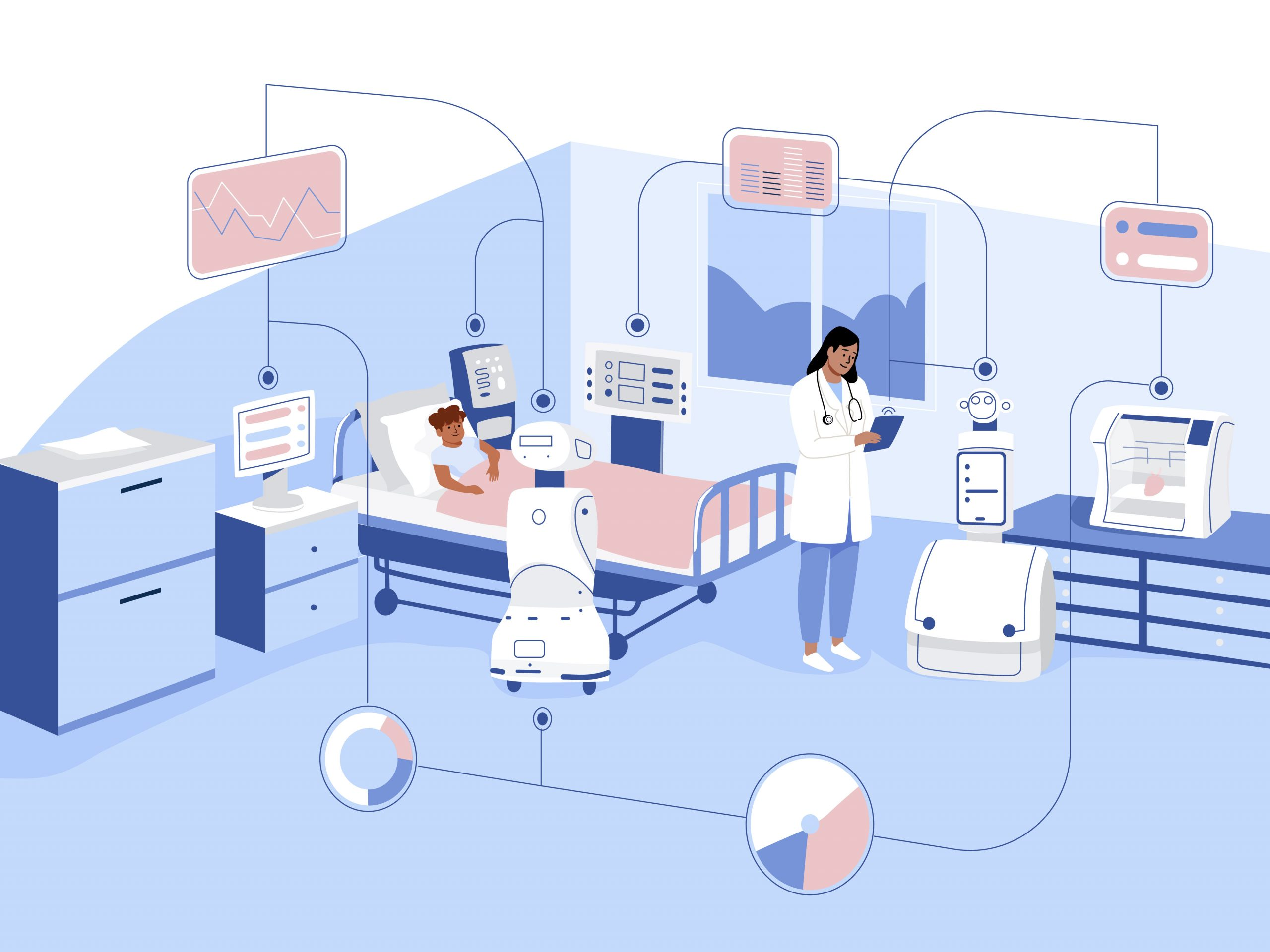
@ShahidNShah


The healthcare landscape is undergoing a profound transformation, marked by the integration of cutting-edge technologies that are reshaping the way hospitals operate and provide care. At the forefront of this revolution are smart hospitals, where the convergence of Internet of Things (IoT) and connectivity is redefining patient experiences, streamlining operations, and elevating medical outcomes. In this article, we delve into the intricate realm of smart hospitals, dissecting their multifaceted impact on operational efficiency, patient care, and the broader healthcare ecosystem.
As the demands on healthcare systems escalate, traditional hospital setups are facing challenges to keep pace with patient needs and technological advancements. Smart hospitals present a paradigm shift, transforming sterile clinical environments into interconnected hubs of innovation. According to a report by Research and Markets, the global smart hospital market is projected to reach $ 82.89 billion by 2026, underlining the escalating adoption and potential of this transformative concept.
At the heart of the smart hospital lies a commitment to patient-centric care, made possible by the seamless integration of IoT devices. From wearable health trackers to smart beds that monitor vital signs, IoT enables real-time data collection and analysis, empowering healthcare providers with comprehensive insights into patient conditions. This data-driven approach enhances diagnostic accuracy, reduces medical errors, and facilitates personalized treatment plans, all while improving patient outcomes.
The smart hospital’s impact extends beyond patient care, encompassing the entire spectrum of hospital operations. IoT-enabled solutions optimize resource allocation, inventory management, and energy consumption, resulting in cost savings and operational efficiency. For instance, smart sensors can monitor the usage of medical equipment, ensuring timely maintenance and reducing downtime. According to Deloitte, 60% of healthcare organizations using IoT have reported improvements in operational efficiency.
Smart hospitals leverage IoT to establish real-time monitoring systems that track patients’ health metrics and alert healthcare providers to potential issues. This proactive approach enables timely interventions and minimizes risks associated with delayed treatment. Research conducted by MarketsandMarkets indicates that the real-time location system (RTLS) segment of the smart hospital market is expected to witness a compound annual growth rate of 25.5% from 2023 to 2028.
Telemedicine has become an integral part of modern healthcare, and smart hospitals amplify its capabilities. IoT devices facilitate remote patient monitoring, enabling healthcare providers to offer virtual consultations and continuous care to patients, even outside hospital walls. This shift towards remote care not only enhances patient convenience but also contributes to reducing the strain on hospital resources and minimizing in-person visits.
While the advantages of smart hospitals are undeniable, the integration of IoT also raises concerns about data security and patient privacy. Hospitals must implement robust cybersecurity measures to protect sensitive patient information from potential breaches. As smart hospitals evolve, ensuring data integrity and patient confidentiality remains an ongoing challenge that demands continuous vigilance and technological innovation.
Smart hospitals operate within a broader healthcare ecosystem that encompasses various stakeholders, including medical professionals, researchers, and technology providers. The integration of IoT and connectivity fosters seamless collaboration by enabling data sharing and interoperability across different systems. This collaborative environment accelerates medical research, facilitates clinical trials, and ultimately drives medical advancements that benefit patients worldwide.
In an era marked by environmental concerns, smart hospitals emerge as champions of sustainability through efficient resource management. IoT-enabled sensors optimize energy consumption, reducing carbon footprints and operational costs. A study by Allied Market Research predicts that the global smart hospital market’s focus on energy management will contribute to its compound annual growth rate of 17.3% from 2019 to 2025.
While the vision of smart hospitals is compelling, their realization is not devoid of challenges. The integration of complex IoT systems demands substantial investments in infrastructure, training, and technological upgrades. Furthermore, the interoperability of various devices and systems requires standardization efforts to ensure seamless communication and data exchange.
Smart hospitals stand as a testament to the boundless potential of technology in revolutionizing healthcare. By harnessing the power of IoT and connectivity, these futuristic healthcare ecosystems offer a glimpse into a world where operational efficiency is optimized, patient care is personalized, and medical advancements are accelerated. As the smart hospital concept continues to evolve, the collaboration of healthcare leaders, technology innovators, and policymakers will be pivotal in navigating challenges and ensuring that these innovative hubs of care flourish and transform the healthcare landscape for the better.
In the ever-evolving landscape of healthcare, two powerful forces are converging: the rising tide of telemedicine and the transformative potential of artificial intelligence (AI). As telemedicine …
Connecting innovation decision makers to authoritative information, institutions, people and insights.
Medigy accurately delivers healthcare and technology information, news and insight from around the world.
Medigy surfaces the world's best crowdsourced health tech offerings with social interactions and peer reviews.
© 2025 Netspective Foundation, Inc. All Rights Reserved.
Built on Apr 24, 2025 at 3:14pm